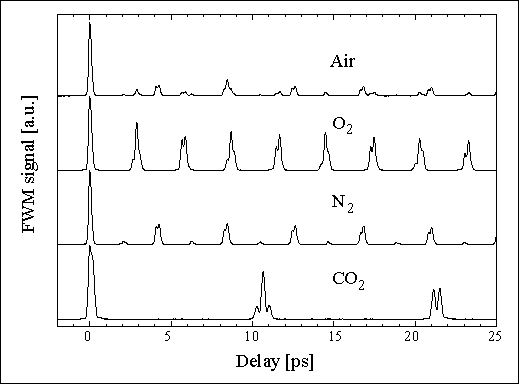Femtosecond off-resonant four-wave mixing
Nonresonant 'degenerate' four-wave mixing (DFWM) experiments were performed on gaseous samples. By delaying one pulse a periodic recovery of the DFWM signal is observed. From the period of the transients the observed experimental findings can be unambiguously assigned to Raman transitions within the laser bandwidth. Rotational constants of the molecules can be determined accurately. The decay of the transients yields the collisional dephasing of the Raman-induced polarization. At zero delay also optical-field-induced birefringence of electronic nature contributes to the signal. The application of the technique to molecular beam experiments and to molecules of lower symmetry (CHCl3,SO2) has been demonstrated.
[1] H.-M. Frey, P. Beaud, T. Gerber, B. Mischler, P. Radi, A. Tzannis, Appl. Phys. B 68, 735, 1999.
[2] H.-M. Frey, P. Beaud, T. Gerber, B. Mischler, P. Radi, A. Tzannis, J. of Raman Spectrosc., 31, 71, 2000.
[3] B. Lavorel, H. Tran, E. Hertz, O. Faucher, P. Joubert, M. Motzkus, T. Buckup,
T. Lang, H. Skenderovi, G. Knopp, P. Beaud, H.-M. Frey, C.R. Physique, 5, 215-229, (2004).
 |
Figure: Four wave mixing signal versus time delay of the probe pulse for Lab-air at room temperature and for atmospheric pressure cells of poor O2, N2 and CO2.